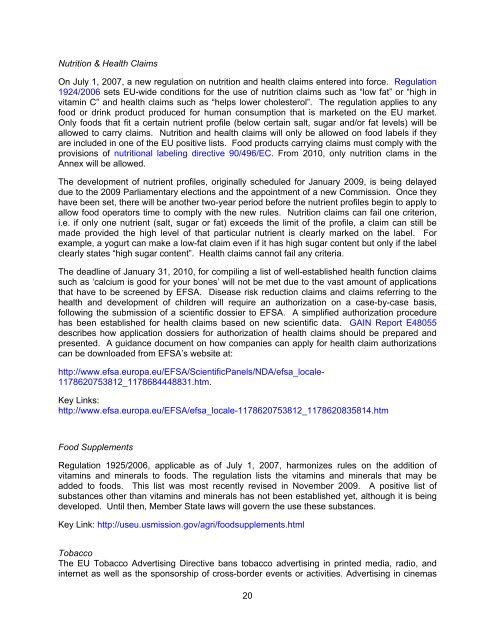Doing Business in Hungary 2010 - International Franchise Association
Doing Business in Hungary 2010 - International Franchise Association
Doing Business in Hungary 2010 - International Franchise Association
Create successful ePaper yourself
Turn your PDF publications into a flip-book with our unique Google optimized e-Paper software.
Nutrition & Health Claims<br />
On July 1, 2007, a new regulation on nutrition and health claims entered <strong>in</strong>to force. Regulation<br />
1924/2006 sets EU-wide conditions for the use of nutrition claims such as “low fat” or “high <strong>in</strong><br />
vitam<strong>in</strong> C” and health claims such as “helps lower cholesterol”. The regulation applies to any<br />
food or dr<strong>in</strong>k product produced for human consumption that is marketed on the EU market.<br />
Only foods that fit a certa<strong>in</strong> nutrient profile (below certa<strong>in</strong> salt, sugar and/or fat levels) will be<br />
allowed to carry claims. Nutrition and health claims will only be allowed on food labels if they<br />
are <strong>in</strong>cluded <strong>in</strong> one of the EU positive lists. Food products carry<strong>in</strong>g claims must comply with the<br />
provisions of nutritional label<strong>in</strong>g directive 90/496/EC. From <strong>2010</strong>, only nutrition clams <strong>in</strong> the<br />
Annex will be allowed.<br />
The development of nutrient profiles, orig<strong>in</strong>ally scheduled for January 2009, is be<strong>in</strong>g delayed<br />
due to the 2009 Parliamentary elections and the appo<strong>in</strong>tment of a new Commission. Once they<br />
have been set, there will be another two-year period before the nutrient profiles beg<strong>in</strong> to apply to<br />
allow food operators time to comply with the new rules. Nutrition claims can fail one criterion,<br />
i.e. if only one nutrient (salt, sugar or fat) exceeds the limit of the profile, a claim can still be<br />
made provided the high level of that particular nutrient is clearly marked on the label. For<br />
example, a yogurt can make a low-fat claim even if it has high sugar content but only if the label<br />
clearly states “high sugar content”. Health claims cannot fail any criteria.<br />
The deadl<strong>in</strong>e of January 31, <strong>2010</strong>, for compil<strong>in</strong>g a list of well-established health function claims<br />
such as ‘calcium is good for your bones’ will not be met due to the vast amount of applications<br />
that have to be screened by EFSA. Disease risk reduction claims and claims referr<strong>in</strong>g to the<br />
health and development of children will require an authorization on a case-by-case basis,<br />
follow<strong>in</strong>g the submission of a scientific dossier to EFSA. A simplified authorization procedure<br />
has been established for health claims based on new scientific data. GAIN Report E48055<br />
describes how application dossiers for authorization of health claims should be prepared and<br />
presented. A guidance document on how companies can apply for health claim authorizations<br />
can be downloaded from EFSA’s website at:<br />
http://www.efsa.europa.eu/EFSA/ScientificPanels/NDA/efsa_locale-<br />
1178620753812_1178684448831.htm.<br />
Key L<strong>in</strong>ks:<br />
http://www.efsa.europa.eu/EFSA/efsa_locale-1178620753812_1178620835814.htm<br />
Food Supplements<br />
Regulation 1925/2006, applicable as of July 1, 2007, harmonizes rules on the addition of<br />
vitam<strong>in</strong>s and m<strong>in</strong>erals to foods. The regulation lists the vitam<strong>in</strong>s and m<strong>in</strong>erals that may be<br />
added to foods. This list was most recently revised <strong>in</strong> November 2009. A positive list of<br />
substances other than vitam<strong>in</strong>s and m<strong>in</strong>erals has not been established yet, although it is be<strong>in</strong>g<br />
developed. Until then, Member State laws will govern the use these substances.<br />
Key L<strong>in</strong>k: http://useu.usmission.gov/agri/foodsupplements.html<br />
Tobacco<br />
The EU Tobacco Advertis<strong>in</strong>g Directive bans tobacco advertis<strong>in</strong>g <strong>in</strong> pr<strong>in</strong>ted media, radio, and<br />
<strong>in</strong>ternet as well as the sponsorship of cross-border events or activities. Advertis<strong>in</strong>g <strong>in</strong> c<strong>in</strong>emas<br />
20
















